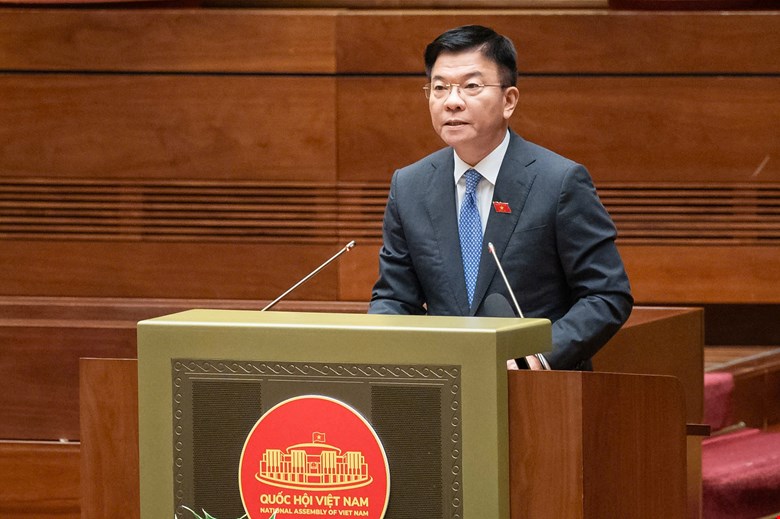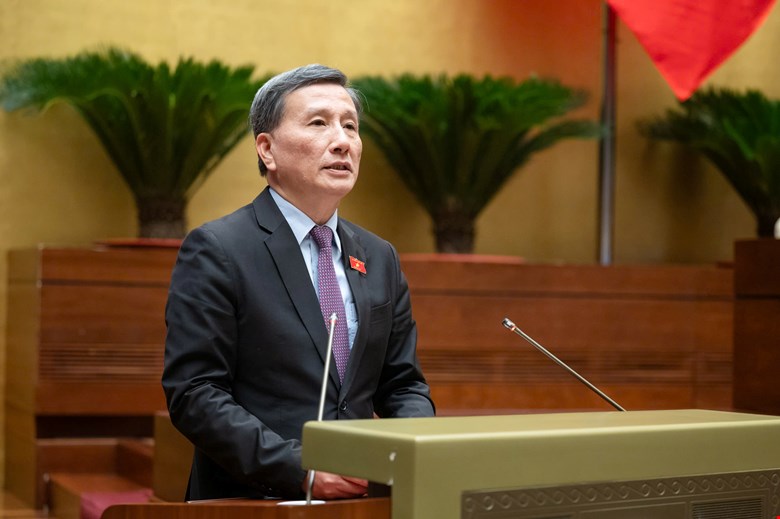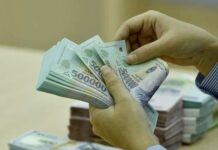On behalf of the Prime Minister, Deputy Prime Minister Le Thanh Long presented the proposal, stating that the law aims to develop the digital technology industry into a significant contributor to the country’s economy. Additionally, a comprehensive legal framework will create an optimal environment to nurture and grow digital technology businesses.

Deputy Prime Minister Le Thanh Long presents the proposal on November 23rd. Photo: Ho Long
According to the proposal, following the government’s instructions and based on the actual situation, the Ministry of Information and Communications proposed to add content on digital assets, artificial intelligence, and adjust the content of semiconductors.
-
Pi cryptocurrency is “heating up” again after a period of inactivity
-
Disillusioned with Pi cryptocurrency investments
-
Urgent study of the legal framework for cryptocurrencies and digital currencies
The draft law reflects that the semiconductor industry is a crucial subdivision of the digital technology industry, relatively complete and physically intensive, with a large enough scale. The draft law stipulates a chapter on “Semiconductor Industry” instead of “Semiconductor Circuits” to ensure comprehensiveness, covering all stages of semiconductor industry activities, aligning with the management objectives and strategies outlined in the Semiconductor Development Strategy.
Recognizing artificial intelligence (AI) as one of the core digital technologies, the draft law provides a definition, management and development principles, and delegates the government to elaborate on this content.
Regarding digital assets, the draft law defines them as intangible assets represented by digital data, created, issued, stored, transferred, and authenticated by digital technology in a digital environment. They are protected by law as property rights, in accordance with civil law, intellectual property law, and other relevant legal provisions. Encoded assets are a type of digital asset.
The draft law authorizes the government to detail the types and management of digital assets and the organizations providing digital asset services, depending on practical conditions. It also outlines measures to safeguard the rights and legitimate interests of organizations and individuals, prevent and limit risks associated with digital assets, and handle related issues.
Presenting the verification report on the bill, Mr. Le Quang Huy, Chairman of the National Assembly’s Committee for Science, Technology, and Environment, stated that the Committee agreed with the necessity to enact the Law on Digital Technology Industry.

Mr. Le Quang Huy presents the verification report. Photo: Ho Long
According to the verifying agency, to vigorously promote the development of the digital technology industry, clear, feasible, and robust policies are necessary, focusing on core elements such as research and development, infrastructure, finance, human resources, and markets. Additionally, support for training and developing human resources, as well as incentives in areas such as land, taxes, finance, and investment, are crucial.
Mr. Le Quang Huy emphasized the importance of regulating digital assets in the draft law. However, as this is a novel and complex issue, careful consideration is required. It is essential to clarify the classification of digital assets and develop corresponding management regulations, addressing ownership, inheritance, and usage rights, as well as security measures, transaction processes, grievance handling, and intellectual property protection. These regulations should align with international practices, facilitate transactions, ensure tight management, combat money laundering, and promote market transparency.
Agreeing on the necessity of regulations for the semiconductor industry, the verifying agency suggested studying and offering outstanding and feasible incentives. They also proposed considering additional provisions for policies favoring experts and scientists and ensuring the provision of essential infrastructure, including clean energy and water.
Regarding artificial intelligence, the agency suggested a comprehensive study to develop a separate law on artificial intelligence (AI) in Vietnam, covering ownership, intellectual and property rights, and respect for authorship, among other aspects.
“FPT and Sun Life Vietnam Join Forces to Elevate Customer Experience with Digital Transformation”
FPT Corporation and Sun Life Vietnam Insurance Company Limited (Sun Life Vietnam) have signed a Memorandum of Understanding (MoU) to forge a strategic partnership. This collaboration, signed on the 6th of November, marks a significant step forward as both entities combine their expertise to enhance their services in the fields of information technology and life insurance.
“Data Management: The Key to Success for Banks Aiming to Soar”
Data is an invaluable asset for banks, and effective data management is key to their success. By harnessing the power of data, banks can gain a competitive edge and make significant strides in the market. With efficient data governance, they can stay ahead of the curve and achieve remarkable breakthroughs, leaving their competitors behind. It is imperative for banks to recognize the significance of data and utilize it strategically to drive their growth and maintain their market dominance.
Why Did Vietnam’s Largest Auto Expo Change Its Name?
The Vietnam Motor Show 2024 has suffered a significant blow with the withdrawal of several major car brands, including Audi, Mercedes-Benz, Volvo, Volkswagen, and Ford. In an attempt to salvage the event, the organizers have had to resort to inviting motorcycle companies to participate and fill the void left by these prominent automotive brands.




















